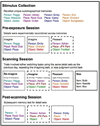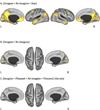Imagining the future: evidence for a hippocampal contribution to constructive processing
- PMID: 23749314
- PMCID: PMC3838494
- DOI: 10.1002/hipo.22152
Imagining the future: evidence for a hippocampal contribution to constructive processing
Abstract
Imagining future events and remembering past events rely on a common core network, but several regions within this network--including the hippocampus--show increased activity for imagining future events compared to remembering past events. It remains unclear whether this hippocampal activity reflects processes related to the demands of constructing details retrieved across disparate episodic memories into coherent imaginary events, encoding these events into memory, novelty detection, or some combination of these processes. We manipulated the degree of constructive processing by comparing activity associated with the initial construction of an imagined scenario with the re-construction of an imagined scenario (imagine vs. re-imagine). After accounting for effects of novelty and subsequent memory, we found that a region in the hippocampus was preferentially activated for newly constructed imagined events compared with re-imagined events. Our results suggest that the hippocampus may support several distinct but related processes that are critical for imagining future events, and they also indicate that a particular region within posterior hippocampus may uniquely contribute to the construction of imagined future events.
Keywords: autobiographical; episodic memory; fMRI; imagination; simulation.
Copyright © 2013 Wiley Periodicals, Inc.
Figures



References
-
- Addis DR, Schacter DL. Effects of detail and temporal distance of past and future events on the engagement of a common neural network. Hippocampus. 2008;18:227–237. - PubMed
-
- Addis DR, Pan L, Vu M-A, Laiser N, Schacter DL. Constructive episodic simulation of the future and the past: distinct subsystems of a core brain network mediate imagining and remembering. Neuropsychologia. 2009;47:2222–2238. - PubMed
Publication types
MeSH terms
Substances
Grants and funding
LinkOut - more resources
Full Text Sources
Other Literature Sources
Miscellaneous

